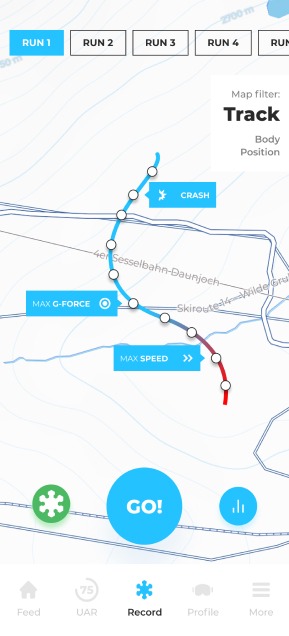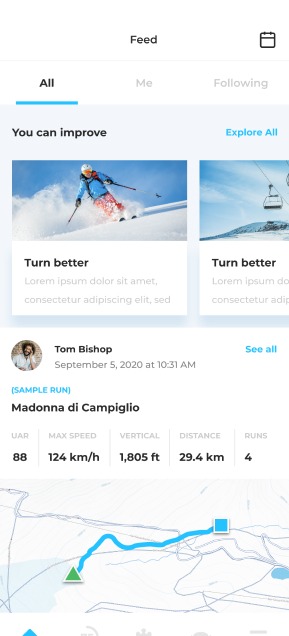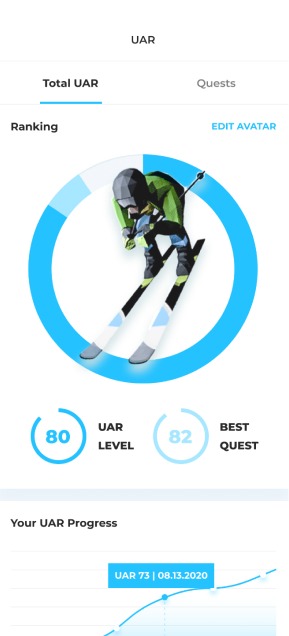SKEO
Bode Miller’s new smart skiing system. Platform and wearable tech tracks 105 things about your skiing
Details
- Scope Software development kit in iOS and Android for the ski sensors, wearables, customer’s application in Flutter, QA
- Timeframes Ongoing since October 2019
- Innovation App performance management, real-time configuration with Leanplum
- Technologies Swift, Kotlin, Flutter
- Business sector Health & Beauty
- Model of collaboration Time & Material
- iteo team 4 x Native developers
6 x Flutter developers
1 x UI Designer
1x PM/BA
2 x QA specialist
Timeline
Works on native software development kits (SDK)
Flutter App development
First freemium release (MVP)
Working on the hardware support
Social login and challenges
Integration with Strava
Project’s highlights
Other apps focus only on a skier’s performance, monitoring basic metrics such as speed, distance, and elevation. SKEO offers more than that – it focuses on understanding the whole chain of events a skier goes through, proving that technology and analytics are able to effectively transform the ski industry.


Business needs & goals
A large group of beginners is not satisfied with their skiing lessons and up to even 70 or 80 percent of them quit at the early stages of their training. It means that for every 10 people who try out skiing, 7 or 8 will resign.
Both Bode and Martin were disappointed with the underappreciation of their favorite sport and saw an opportunity to change it. They wanted to create a free platform being a training solution for skiers on every stage of advancement. It was supposed to help them measure their performance, improve their skills, check each others’ statistics, and gain access to useful coaching tips, being highly accessible at the same time. Everyone would be able to download the app on their phone.
Additionally, there was going to be a possibility of upgrading the experience by using three wearable sensors – one on each ski and one on the chest.
Functionality
Universal Alpine Ranking (UAR)
Developed by Bode Miller is a scoring ranking with a baseline
metric to evaluate the user’s performance based on
a personal survey and data acquired during
actual skiing.
Comprehensive run stats
Allow users to track their individual speed, turns, pace, vertical, mileage, and G-force with every slide.
Quest challenges
For successful development, quests are applied to the elements that need to be improved and are adjusted individually to the user’s abilities.
3D avatar
The app was integrated with a visual depiction of the skier’s position based on the gathered movement analysis and helping provide professional feedback.
Community engagement
It lets the users follow each other within the app depending on their location and personal privacy preferences. They can compare the results and challenge one another to boost their overall performance.
Body positioning
It’s a feature available for skiers who train with sensor hardware. It uses a mountain simulator to record ski tracks and provide valuable feedback on edge angle and body positioning. The information is shown both in a form of data and 3D avatar video. It’s great when it comes to improving one’s speed and maximally controlling the position of the body.

Technologies
Flutter
Developed by Bode Miller is a scoring ranking with a baseline metric to evaluate the user’s performance based on a personal survey and data acquired during actual skiing.
Native libraries – Swift & Kotlin
Swift allowed us to provide robust performance, seamless synchronization, and appealing design. The language is known for its speed and clean, safe code allowing us to create a spot-on product for iPhones.
Kotlin was our choice for Android. We used it for its concise code, safety, productivity, compatibility, and easy maintenance.
Innovation
Universal Alpine Ranking (UAR)
It provides an objective ranking system which is able to evaluate skiers on different levels of advancement – from first-timers to World Cup Racers. The app gathers data about users’ performance and technique and ranks them from 1 to 100. The evaluation changes along with the skier’s performance – after taking part in various quests and collecting points.
UAR consists of 3 elements – survey, initial assessment, and regular quests completion, as well as progression.
It measures
- Maximum speed, average speed, and maximum G-force resistance
- Total and average distance skied and Vertical Drop Quests
- Upper body position, lateral balance, and hip angulation
- Ratio of long to short turns, time spent in turns, turn “streaks”, and turn initiation
- Slope incline and vertical drop
Challenges & solutions
Sensors development
We developed dedicated sensors that can be connected to the SKEO app to provide better and more accurate analysis and UAR measurements. A very important aspect of this project was to keep modular, layered architecture, respecting the technology stack needed on each layer.
The project is built of modules written in native mobile languages to provide native access to low-level system interfaces. Application also integrates Unity modules and Algorithms written natively in C++.
The kit includes:
- 3 SKEO sensors
- 2 adhesive ski mounts
- 1 chest harness
Complexity and background operations
The app supports customers using tablets which requires responsive app views behaviour. Depending on the device size, we automatically scale views to the specific screen size or, in special cases, rearrange view elements to make them more user friendly.

UI design
The graphic layer of SKEO was quite a challenge. Client requirements were to show as much data as possible while maintaining the greatest possible readability. Thanks to the white interface combined with snowy colors, we’re sure that we achieved that. We wanted to create something user-friendly, easy and as intuitive as possible. Thanks to the great cooperation of our teams, and the implementation of a 3D avatar within the app, we have created a truly unconventional product that will be perfect for skiers and other people associated with this group.
Quality assurance
We started the testing process by recognizing the project’s specifications. Our team received sensors coworking with the mobile application, but because the client tested the equipment’s performance before, we focused on connectivity tests. We verified how the app behaves when it loses bluetooth connection with sensors and how they react in such a situation. Additionally, we needed to check the correctness of pairing the device with sensors and if the launched app connects automatically to the paired device when it’s activated.
Developers supported the QA team in simulating the product’s performance in real-life conditions which allowed verifying the mobile app’s behavior. The tests were performed on Android and iOS – we verified all the functionalities and current updates to newest versions.
Reviews
Outcome
The app is appreciated by users and experts – it gets positive opinions and reviews in both the world of technology and sports, providing skiers with thorough analysis of their efforts and helping them enhance their skills.










